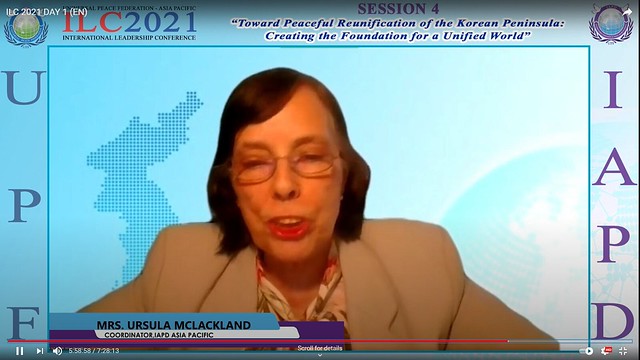ILC2021 Asia Pacific: Religious Leaders and Faith-based Organizations
Written by UPF-Asia Pacific
Thursday, April 29, 2021
Asia Pacific—The Interreligious Association for Peace and Development (IAPD) hosted Session Four of the International Leadership Conference 2021 (ILC2021)—Asia Pacific program, which was convened on April 29, 2021, under the theme, “The Role of Religious Leaders in Contributing to Peace on the Korean Peninsula.” Five distinguished speakers shared their perspectives on the peaceful reunification of the two Koreas. Around 1,750 people from 42 countries registered for the session, and thousands watched it via Zoom and social media.
Acharya Dr. Shrivatsa Goswami, head priest of the Radharamana Temple, India and chairman of the IAPD-Asia Pacific, gave the opening remarks. Speaking from a Hindu perspective, he said that absolute separation and division is never welcome because the ideal of creation and life itself is unification. Ultimately, the peoples of North and South Korea will unite and come together. Unfortunately, human beings are contented with the division of religions; however, this is a great error that we must be concerned about. We must realize that we are one family in the eyes of God. UPF founders Rev. Sun Myung Moon and Dr. Hak Ja Han. Moon have explained that the best example of unity would be the reunification of the two Koreas and that it would be a foundation towards a unified world. Dr. Goswami concluded his remarks by saying that religious leaders have to pray and work together for this noble objective.
Dr. Khlot Thyda, former president of the Royal Academy of Cambodia, gave a Buddhist perspective. She began by enumerating 25 points of religious function in our society that explain our role as individuals in society. Dr. Thyda reiterated the Buddhist teaching, saying, “No enemy can inflict as much pain on an individual as on one’s own greed, guilt and selfishness.” She emphasized the importance of selfless living and practicing acts of goodness. She concluded her presentation by underscoring that we cannot deny the presence and relevance of religion, which has a positive impact on people.
Rev. Fr. Edgardo C. De Jesus, a Catholic priest from the Parish of the Holy Cross, Philippines, presented his views from a Catholic perspective. He said that religious leaders must move forward by focusing on fostering understanding and compassion amidst the political divisions and territorial boundaries that exist in our world. Responsible religious leaders must inspire people to be compassionate and empathetic. Rev. De Jesus also said that the greatest enemy of society is apathy, which defeats our purpose as human beings. Lack of caring and empathy must be removed from the minds of every individual. This starts with the practice of taking care of one another. He encouraged everyone to raise awareness of this knowledge.
Dr. Tong Yun Kay, president of the Hong Kong Confucius Academy from Hong Kong, presented his views from a Confucian perspective. He said that if we examine the situation between North and South Korea from a Confucian perspective, we see that it is a family conflict, between brothers. Their contentious relationship reveals conflicts of interest not only between them, but also their extended families, which include the powerful nations of China, Russia, Japan and the United States. He concluded by saying that people need examples of righteous behavior; commitment to truth; and love, respect and concern for others. It is the role and responsibility of religious leaders, who represent the spiritual traditions of humanity, to maintain a high ethical standard and guide others, beginning with their own families.
Dr. Quat Ergaliuly, a doctor of Theological Sciences from Kazakhstan, presented his views from an Islamic perspective. He began his remarks by quoting the proverb, "Wealth is not wealth; unity is wealth." He stressed that there is no doubt that the dream, goal and aspiration of any country is to live in peace and harmony, in their own country and with their neighbors. Kazakhstan not only promotes peace and spiritual revival within the country, but it also has always called on the world community to engage in constructive dialogue at the global level. Dr. Ergaliuly concluded his message by urging everyone to work together and that the main task for all of us is to work selflessly for peace and spiritual unity of the world.
Dr. Tageldin Hamad, vice president of UPF International, international coordinator of IAPD and chairman of the World Association of Non-Governmental Organizations (WANGO), gave the concluding remarks. He underscored that religious leaders need to roll-up their sleeves and make efforts to realize peace on earth. This is the main mission of religions and it includes working together to support the reconciliation of the two Koreas. Only with the help of God can we accomplish this.
Rev. John Adamedes, coordinator of IAPD-Oceania, facilitated the Q&A session. Mrs. Ursula McLackland, coordinator of IAPD-Asia Pacific, moderated the session.
If you find this page helpful and informative please consider making donation. Your donation will help Universal Peace Federation (UPF) provide new and improved reports, analysis and publications to you and everyone around the world.
UPF is a 501(c)(3) tax exempt organization and all donations are tax deductible in the United States. Receipts are automatically provided for donations of or above $250.00.
|
Donate to the Universal Peace Federation: Your donation to support the general programs of UPF. |
Donate to the Religious Youth Service (RYS): Your donation will be used for service projects around the world. |
Donate to UPF's Africa Projects: Your donation will be used for projects in Africa. |

